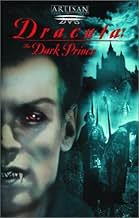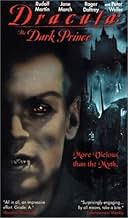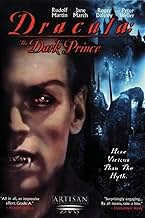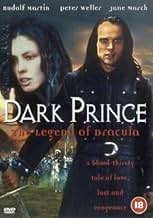NOTE IMDb
6,0/10
2,8 k
MA NOTE
Ajouter une intrigue dans votre langueThe dramatized story of Dracula, looking at the historic events rather than the Hollywood version.The dramatized story of Dracula, looking at the historic events rather than the Hollywood version.The dramatized story of Dracula, looking at the historic events rather than the Hollywood version.
- Récompenses
- 1 nomination au total
Histoire
Le saviez-vous
- AnecdotesIn 2000, to promote the film's premiere, USA Network held a sweepstakes contest with a grand prize of $5,000 to the lucky person who can correctly identify five myths of Dracula as depicted in this film.
- Citations
Radu: You are going to kill me, aren't you?
Vlad Dracula: You are a traitor to your people. You betrayed our father!
Radu: I never betrayed our father! Besides, if it weren't for me, you'd still be in that Turk prison.
Vlad Dracula: You had that much influence over the Sultan? Even as a boy?
Radu: Especially as a boy.
- Bandes originalesLa Scarpa My Faict Mal
Written by Bernard Solomon (as J. Baird) and Frank Gari (as F. Gari)
Commentaire à la une
The movie deals with the so-called historical figure of Vlad Tepes (phonetically that is "Tzepesh" and it literally means "Impaler"), not the vampire of Bram Stoker but the tormented Wallachian (Romanian) medieval ruler that stood against the might of the Ottoman Empire with nothing but a few trained men of his own and his reputation as master of psychological warfare by means of sheer terror and unprecedented scale of prisoner execution through impalement (Google on that for detailed info). Vlad's father, also called Vlad, was a member of the Teutonic knightly order of the Dragon, which had been established in Germany with the purpose of protecting Christianity against the rise of Islam at the gates of Europe. His affiliation with this order gained him the surname "Dracul" which is a Romanian translation for "Dragon" and also a synonym for "devil". Vlad the Impaler, that is the son of Vlad Dracul, inherited his father's membership into the order of the Dragon, but because he was the son of Dracul, he was named "Draculea", or "Dracula", which means "son of Dracul", son of the Dragon, and ultimately son of the devil. His reputation as a mad executioner would be well justified by today's standards, although he was just a babe when compared to other rulers of his time (his own cousin, Stephen the Great, ruler of Moldavia, "the Athlete of Christ" as he had been named by the Pope for having repeatedly beaten the crap out of the Turks, had reportedly killed many more people through impalement than Vlad but because he had always been politically correct, he never went down into history as a deranged butcher). Vlad Tepes had the Saxons of Transilvania account for their transgressions against the conquered local Romanian population and it was because of the vengeful literate Germans who wrote exacerbated stories about him that he was later on remembered as the sadistic figure we now read of in the history books. He had also been ruthless with the breaking of the law in his own land. The only punishment instituted for whatever crime committed, regardless of its seriousness, was the one and only impalement. It's because of this that, during his reign, crime had reportedly dropped to nil. That is why, for the Romanians, he's still, up to this day, considered a national hero of special importance, unlike any other, because his name is called upon in times of great oppression, when corruption and plundering of the national economy by the oligarchic political class bring the common, ordinary citizens on their knees. When confronted with such disasters, Romanians cry out the verses of Mihai Eminescu (1850-1889), the greatest national poet of Romania, who had even written a poem in Tepes's honor which, in time, became a sort of a prayer for those crushed by the arrogance of the ruling class. In a few words, it goes something like this (in free translation):
"Where are you, lord Tepes / So that, by grabbing them / You would divide them in two packs: / Lunatics and scoundrels. / And in two large jails / You would forcibly gather them / And then set fire to the prison / And the madhouse."
(sounds much, much better in Romanian...lol :)))
"Where are you, lord Tepes / So that, by grabbing them / You would divide them in two packs: / Lunatics and scoundrels. / And in two large jails / You would forcibly gather them / And then set fire to the prison / And the madhouse."
(sounds much, much better in Romanian...lol :)))
Meilleurs choix
Connectez-vous pour évaluer et suivre la liste de favoris afin de recevoir des recommandations personnalisées
Détails
- Date de sortie
- Pays d’origine
- Langue
- Aussi connu sous le nom de
- Dracula: The Dark Prince
- Lieux de tournage
- Sociétés de production
- Voir plus de crédits d'entreprise sur IMDbPro
Contribuer à cette page
Suggérer une modification ou ajouter du contenu manquant

Lacune principale
By what name was Dark Prince: The True Story of Dracula (2000) officially released in Canada in English?
Répondre


























